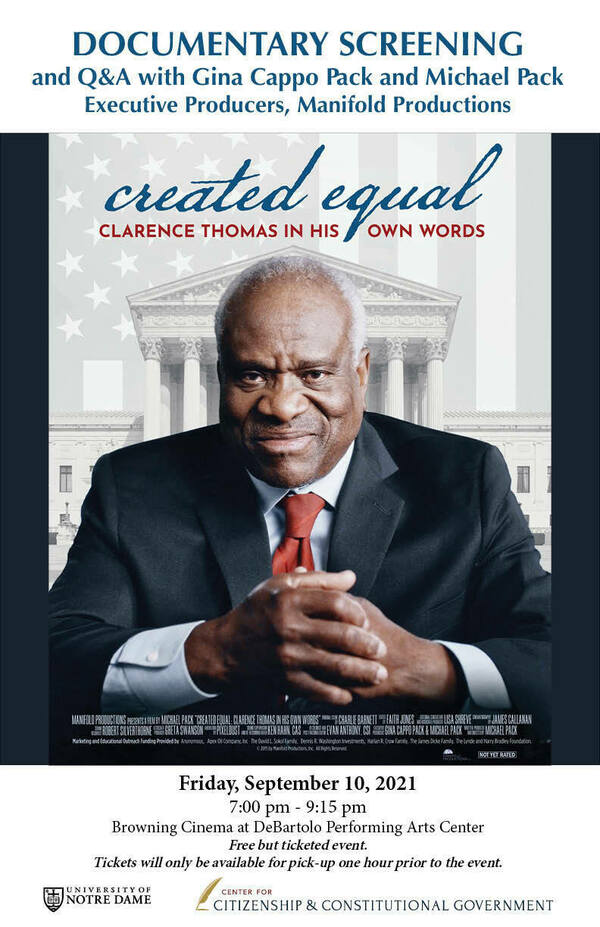
The Center for Citizenship and Constitutional Government is pleased to present a screening of Created Equal: Clarence Thomas in his own Words with Executive Producers Gina and Michael Pack (Manifold Productions, Inc.).
Although Clarence Thomas remains a controversial figure, loved by some, reviled by others, few know much more than a few headlines and the recollections of his contentious U.S. Supreme Court confirmation battle with Anita Hill.
Behind the headlines, Thomas's life is a classic American tale: born poor in the segregated South, only to become one of the most influential justices in the highest court of the land. Unscripted and without narration, the documentary takes the viewer through this complex and often painful life, dealing with race, faith, power, jurisprudence, and personal resilience.
This is a free but ticketed event. Tickets will only be available for pick-up one hour prior to the performance. To guarantee your reservation please pick-up your Will Call tickets at least 15 minutes prior to the performance. In the event of a sell out, unclaimed Will Call tickets will be used to seat patrons waiting on standby.
Questions? Reach us at cccg@nd.edu.
About Justice Thomas:
In 1948, Clarence Thomas was born into dire poverty in Pin Point, Georgia. His father abandoned the family when Thomas was two. His mother, unable to care for two boys, brought Thomas and his brother, Myers, to live with her father and his wife. Thomas’ grandfather, Myers Anderson, whose schooling ended at the third grade, delivered coal and heating oil in Savannah. He gave the boys tough love and training in hard work. He sent them to Catholic school.
From there he entered the seminary, training to be a priest. Angered by his fellow seminarians’ racist comments following the assassination of Martin Luther King, Jr. and disillusioned by the Catholic Church’s general failure to support the civil rights movement, Thomas left. His disappointed grandfather kicked him out of the house but the College of the Holy Cross in Massachusetts offered him a full scholarship. There, he helped found the Black Student Union and supported the burgeoning Black Power Movement. Then, Thomas’ views began to change, as he saw it, back to his grandfather’s values. He judged the efforts of the left to help his people to be demeaning failures. He watched the busing crisis in Boston tear the city apart. Why, Thomas asked, pluck poor black kids out of their own bad schools only to bus them to another part to bad white-majority schools?
At Yale Law School, he felt stigmatized by affirmative action, treated as if he were there only because of his race. After graduating, he worked for then State Attorney General John Danforth in Missouri, eventually working in the Reagan administration, first running the Civil Rights Division of the Department of Education and then the Equal Employment Opportunity Commission. In 1990, he became a judge on the U.S. Court of Appeals for the District of Columbia Circuit.
In 1991, President George H.W. Bush nominated Thomas to the Supreme Court. When he was on the verge of being confirmed, a former employee, Anita Hill, came forth to accuse him of sexual harassment. The next few days of televised hearings riveted the nation. Thomas accused the Senate of running “a high-tech lynching for uppity blacks.” Although the American people believed Thomas by more than a 2-1 margin, he was confirmed by the closest margin in history, 52-48. In his 25 years on the Court, Thomas’ jurisprudence has often been controversial — from his brand of originalism to his decisions on affirmative action and other hot button topics.
In accordance with current Notre Dame policy, please note that all visitors to campus, regardless of vaccination status, are expected to wear masks inside campus buildings (except when eating and drinking). Anyone who would prefer to wear a mask in any setting is welcome to do so. We should be kind and respectful of everyone in our community and of their choices at all times.